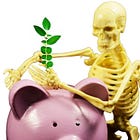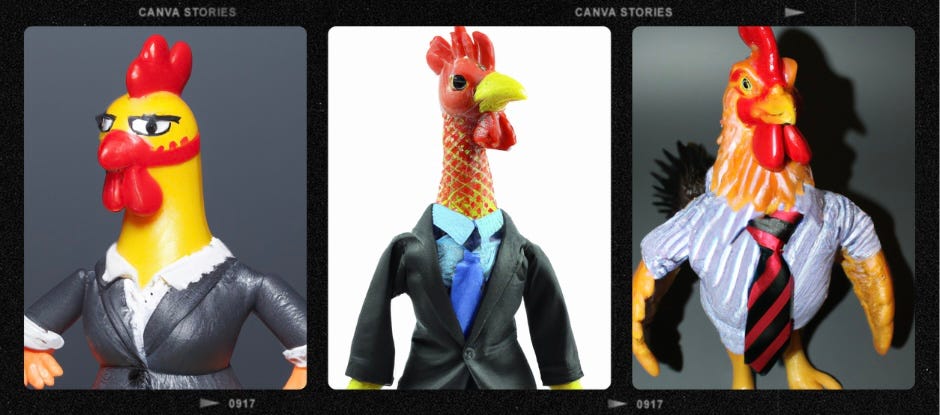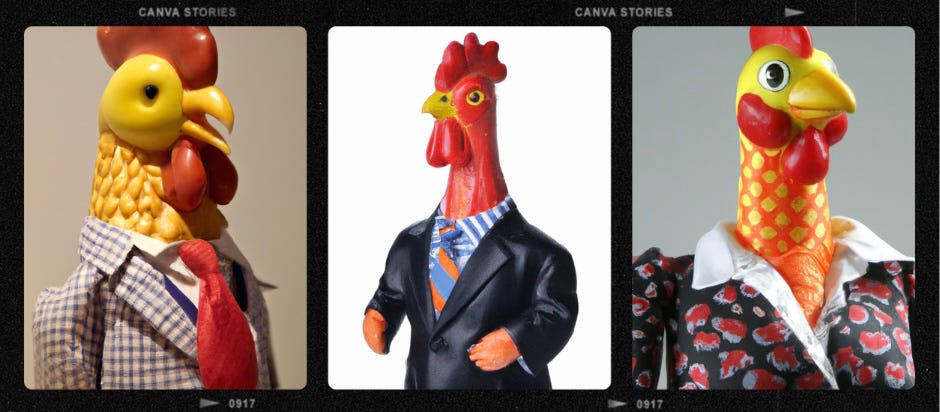so much depends
upon
a red wheel
barrow
glazed with rain
water
beside the white
chickens.
William Carlos Williams
My brother, an engineer, used to design control systems for manufacturing plants. Many of his clients came from the pharmaceutical industry, which generated a ton of anecdotes about the wonderful wooly world of drug companies.
One of his best observations was what he dubbed the “rubber chicken effect.” As he tells it, pharmaceutical manufacturers, particularly back in the day, sometimes just stumbled into a new concoction by mixing things until they got the results they wanted or some other unexpected yet desirable result. A classic case is Viagra, which was being tested as a potential heart medication, and then up popped this other use! When my brother came in to design a manufacturing system for the new product, these companies insisted it replicate every minute step of their ad hoc process, no matter how inconsequential or frivolous. My brother’s punchline was that if someone had waved a rubber chicken in the air when they first concocted the drug, they would demand that the machine did the same as it churned out pills. That is the rubber chicken effect. Its a form of risk aversion. Take no chances! Change nothing!
Arguably this effect is not entirely benign since it sometimes may contribute to pharmaceutical side effects. For instance, the original formulation may contain substances that turn out to have nothing to do with the drug’s intended effect but are included out of fear of messing with success. These extraneous components are one form of my brother’s rubber chicken.
Of course, the rubber chicken effect is not limited to pharmaceutical companies. You see it in every complex industry where individuals stumble upon positive outcomes and endlessly repeat the steps without regard for what truly works, what doesn’t, or whether anything works at all!
I had the grand privilege of working at a college that—despite dedicated faculty and staff—rubber chickened itself into mediocrity. The school had weathered a financial crisis years before my arrival. The newly-appointed president and her team had managed to keep the institution afloat but just barely. The board of trustees hailed them as heroes while ignoring the chronic and systemic problems that persisted. I have already written about the ensuing scarcity mentality they endured.
From my vantage point, it was clear that the president and her team—much like those old drug companies—lacked a solid understanding of their own operations. So, you guessed it, they just kept doing it, all of it. They rubber-chickened everything no matter the consequences. One particularly peculiar practice was called “confirmation,” the brainchild of a vice president who designed the process to help keep students enrolled. Except it apparently did nothing of the kind and may have contributed to the opposite.
Confirmation dominated the first day of each semester, and all other activities, important office work, or even teaching were suspended for the day. Yes, that’s right. We delayed the start of classes for this unholy sacrament of confirmation. The ritual required a battalion of staff to sit behind tables while every student obediently march through a gauntlet of check-ins. The idea was to prevent students from falling through any conceivable crack, which sounds noble. In reality, though, virtually all the students had completed these tasks beforehand. In other words, confirmation was largely redundant and therefore a colossal waste of time for both students and staff. Worse still, students still managed to slip through the cracks!
The next time you are out and about and happen to witness the rubber chicken effect in action, ask yourself, “what are the side effects?” That college’s confirmation ritual, for instance, yielded a range of unintended consequences. Aside from squandering everyone’s time, the day left everyone exhausting and many demoralized—not an ideal launch to a college semester. Moreover, canceling classes had ramifications for the entire semester schedule. The worst effect was the message confirmation sent to the students regarding taking personal responsibility and what they should prioritize as they pursued an education.
The Magic Chicken
The rubber chicken effect is a sort of magical thinking, a talisman, or a superstition. Baseball players are notoriously superstitious. If a batter puts on a new pair of socks at the start of a hitting streak, he might wear those same socks until the streak ends. As silly as that sounds—although ball players can be deadly serious about it—how is it any more silly than repeating business practices that have no relevance to success and may even cause harm?
Do you hear that? It’s the rubber chicken defenders countering with their mantra, chanted with religious fervor: “But this is how we’ve always done it! There can be no other way!” They might as well add, “Damn the waste and unintended consequences! Full steam ahead!”
The rubber chicken rotates in other settings as well. It could be the overprotective parent who once nursed a child through a health crisis and still babies her at age 35. Or what about the company that requires exhaustive forms for every action because one time a form may have helped prevent a mistake? Then there’s that boss who double-checks everyone’s work because he once got burned. His people grow resentful of his lack of trust. The workplace culture sours. Employees flee. And whom does the micromanaging boss blame? The workers, of course, as he waggles that rubber chicken over his head.
The rubber chicken effect is psychic comfort food. It comes from a place of fear not confidence. It is playing not to lose rather than playing to win, surviving but never really excelling. It’s no way to live and certainly no way to run a business or lead an organization. It’s also dishonest. To declare, “I did everything I could to succeed,” when all you did was wave a rubber chicken, is a fraud. Ignoring the consequences of your rubber chicken wagging is self-deceiving and cowardly.
Every action we take has consequences—whether significant or trivial, positive or negative. Waving a rubber chicken contributes nothing to progress and may even do harm. Great leaders understand all this, making decisions, taking action, and changing direction based on their best determination of the path toward success. They know that a rubber chicken is nothing more than a novelty toy, a silly prank gift, a gag. The rubber chicken effect, though, can do some real damage. It’s no laughing matter.
Where do you see the rubber chicken effect in action? Do you ever succumb to it?
A great leader must know how to avoid redundant, meaningless, and counterproductive processes, and I can help.
If you want to learn more about how to become a great leader in this world of bad bosses, visit GuidanceForGreatness.com.
Join the conversation by leaving a comment, and leave a like or review.
Please share this post on social media.
And be sure to SUBSCRIBE to have On Leading with Greatness sent weekly to your inbox.


















Share this post